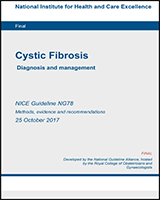Study identification
M.P. McIlwaine, M. Richmond, J.L. Agnew, N. Alarie, L. Lands, M. Chilvers, F. Ratjen
WS5.6 Cost-effectiveness of performing positive expiratory pressure versus high frequency chest wall oscillation. Journal of Cystic Fibrosis, Volume 13, Supplement 2, Page S11 |
|---|
| Guidance topic: Cystic Fibrosis | Question no: 6 |
|---|
| Section 1: Applicability (relevance to specific review questions and the NICE reference case as described in section 7.5) | Yes/partly/no/unclear/NA | Comments |
|---|
| 1.1 Is the study population appropriate for the review question? | Yes | People with CF |
| 1.2 Are the interventions appropriate for the review question? | Yes | PEP & HFCWO |
| 1.3 Is the system in which the study was conducted sufficiently similar to the current UK context? | Yes | Canada |
| 1.4 Are the perspectives clearly stated and are they appropriate for the review question? | Unclear | Non-societal and direct heath care inferred |
| 1.5 Are all direct effects on individuals included, and are all other effects included where they are material? | Partly | HRQoL not considered |
| 1.6 Are all future costs and outcomes discounted appropriately? | NA | Time horizon: 1 year |
| 1.7 Is QALY used as an outcome, and was it derived using NICE’s preferred methods? If not, describe rationale and outcomes used in line with analytical perspectives taken (item 1.4 above). | No | Outcome measure: cost of therapy & number of exacerbations |
| 1.8 Are costs and outcomes from other sectors fully and appropriately measured and valued? | Unclear | |
| 1.9 Overall judgement: Partially applicable |
|
Other comments:
|
| Section 2: Study limitations (the level of methodological quality) | Yes/partly/no/unclear/NA | Comments |
|---|
| 2.1 Does the model structure adequately reflect the nature of the topic under evaluation? | NA | Cost-benefit analysis alongside RCT |
| 2.2 Is the time horizon sufficiently long to reflect all important differences in costs and outcomes? | Partly | Time horizon: 1 year |
| 2.3 Are all important and relevant outcomes included? | Partly | QoL outcomes not considered |
| 2.4 Are the estimates of baseline outcomes from the best available source? | Yes | From RCT |
| 2.5 Are the estimates of relative intervention effects from the best available source? | Yes | From RCT |
| 2.6 Are all important and relevant costs included? | Partly | Lack of detail |
| 2.7 Are the estimates of resource use from the best available source? | Partly | From RCT |
| 2.8 Are the unit costs of resources from the best available source? | Unclear | Sources not reported |
| 2.9 Is an appropriate incremental analysis presented or can it be calculated from the data? | Yes | Difference in cost / difference in exacerbations calculable |
| 2.10 Are all important parameters whose values are uncertain subjected to appropriate sensitivity analysis? | No | Only point estimates reported |
| 2.11 Is there any potential conflict of interest? | No | |
| 2.12 Overall assessment: Severe limitations |
Other comments:
Are money-costs and ‘benefits’ which are savings of future money-costs evaluated? No
Have all important and relevant costs and outcomes for each alternative been quantified in money terms? Yes, medical costs appear to include the cost of treating exacerbations, but limited details in conference paper
Has at least 1 of net present value, benefit/cost ratio and payback period been estimated? No, only net present value. Equipment does not appear to be annuitised over the lifespan
Were any assumptions of materiality made? No, all relevant costs appear to be included, but limited details in conference paper |
